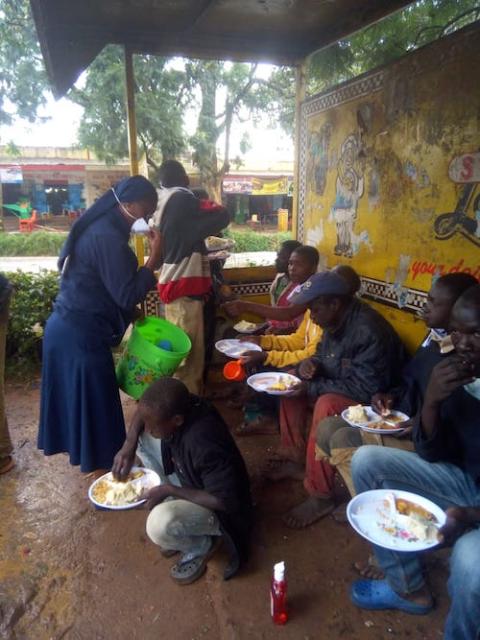
Dozens of street kids in Kitale town receive a meal from Sr. Winnie Mutuku, who is overseeing the feeding of street boys under COVID-19 restrictions. (Provided photo)

(GSR/Toni-Ann Ortiz)
Editor's note: More than 1.6 billion people worldwide live in substandard housing. Of those, at least 150 million have no home at all. In this special series, A Place to Call Home, Global Sisters Report is focusing on women religious helping people who are homeless or lack adequate shelter. Over the next few months, we will examine how homelessness and a lack of affordable housing affect teens and young adults, families, migrants, the elderly and those displaced by natural disasters and climate change in stories from Kenya, India, Vietnam, Ireland, Puerto Rico, the Philippines, the United States and elsewhere.
As the COVID-19 pandemic continues to ravage the country with devastating economic results, Sr. Winnie Mutuku has managed to sustain a feeding program for street children and families in Kitale, a town in western Kenya about 280 miles from the capital, Nairobi.
The East African nation has no official figure on the number of homeless children. However, Consortium of Street Children, an international charity, estimates that the number of street children nationwide could be as high as 300,000.
A 2015 Child Rescue Kenya report estimated 700 children in Kitale linger along the streets begging for anything from passers-by. Many of them sniff glue and jet fuel, not caring about the risks it poses to their health. For these street children to get food, they forage through rubbish bins and dumpsites, yet another risk to their health.
Amidst the rising concern of COVID-19, with the country's health ministry confirming more than 1,000 cases and at least 50 deaths so far, there is mounting concern for the wellbeing of street families and the underprivileged who can do little to protect themselves from the virus.

Sr. Winnie Mutuku is a member of the Congregation of the Daughters of Charity of St. Vincent de Paul (Provided photo)
The Kenyan government has restricted movement and issued a nationwide curfew from 7 p.m. to 5 a.m. to slow down the spread of coronavirus, making the lives of street children even worse.
Mutuku, who manages Upendo Street Children — a project run by the Daughters of Charity of St. Vincent de Paul — has reunited many children with their families to avoid their being arrested by police during curfew hours. The charity organization, based in the Kitale Diocese, aims to restore dignity to the homeless children, educate them and ultimately reunite them with their respective families.
Children not lucky enough to find their families have been forced to spend nights in forests away from Kitale town and its surrounding villages, she said. Mutuku cooks food at the church and takes it to the street at daybreak to make sure the kids have something to eat.
GSR: Who is Sr. Winnie Mutuku?
Mutuku: I'm a Kenyan native belonging to the Congregation of the Daughters of Charity of St. Vincent de Paul. I'm also a graduate from Catholic University of Eastern Africa in Nairobi with a bachelor's degree in social communication. Currently, I'm working on developing a new project for street children in the western part of Kenya [Kitale] where the Daughters of Charity have been engaged in services for 11 years.
Tell us about your ministry
I came to Kitale in July last year to do a feasibility study in preparation to respond to the issues of street children in Kitale town. In the process of this work, I interacted with many organizations working in Kitale, including government entities, just to identify what they do and the gaps that are there in working with street children. From gathered research information, I developed a project identifying the gap that we might be expected to fill in working with children. I drew up a project, which I presented to my mission superiors, and there it was approved. I began by constructing a drop-in center, which included shower rooms, laundry and changing rooms for the children.

Street children gather at the Upendo Street Children center to have their meals before the government confirmed its first case of COVID-19 on March 12 and such centers were forced to shut down. (Provided photo)
I also did an internal advertisement [to interview and hire] staff, which I conducted early in the year. In the meantime, I was going to the field just to meet children in their bases and interact with them and identify the situations in the streets (without any idea of recruiting them yet). I invited them for a Christmas party in 2019, still in the process of making sure that they knew the area and could manage the distance to the drop-in center. About 72 children turned up for the party. This was not yet the beginning of Upendo project because I was still developing the administration and management systems.
The staff was ready on the 17th of January to set up support and to give their input in some areas where I needed suggestions. On January 28th, about 46 children turned up in the center. We had not even gone out to begin inviting them yet. That marked the beginning of Upendo project.
What do you think are the main causes of homelessness that have driven hundreds of children to the streets of Kitale?
Poverty is the main cause of homelessness. This is created by many aspects; for example, lack of jobs for young people who eventually have young families, cultural values where men are free to marry several wives (it doesn't matter to them even when they cannot provide for the children). Children belong to the father and so, if the couple separates, children are left with the father, who marries a second wife and exposes the other children to maltreatment by the second wife. In the culture, when boys are circumcised, they are termed grown-ups and now cannot live in the mother's house. In cases where the parents cannot afford to build a separate house for the boy, he opts to go to the streets [to avoid social censure and harm to his family]. Also, family conflicts and breakups are another aspect that is contributing big time to street children and homelessness.

Street families are served food by Sr. Winnie Mutuku in Kitale town, western Kenya. (Provided photo)
How has this experience of working with street children influenced your spirituality?
No one chooses to be in the streets or to be poor. Sometimes there is a lot that people don't know behind why people live in the streets and, therefore, this has helped me to turn the coin and see the face of God in the homeless. I have a different perspective about this form of poverty now, and that draws me to think of God being homeless in the sphere of the world he created.
How has your ministry been affected by COVID-19?
In the wake of COVID-19, the challenges came because we had to close, meaning the street children can't come to the center because we don't have an accommodation. Circumstantial home placement began because now even the street was not safe for them. Some were placed with relatives, neighbors and grandparents. During this time, family support would accompany any visit because some families were poor and so we had to support them and the child in order to keep them home. Among the 33 that had remained consistent in our center, 23 were placed in homes, and the 10 who had nowhere to go had to remain in the streets.

Sr. Winnie Mutuku gives food to the street children in Kitale, a town in western Kenya, amid the COVID-19 pandemic. (Provided photo)
Our service in the midst of COVID-19 was developed, and we decided to do follow-ups on children in the homes, while providing soap, food and bedding for those who needed them. We do these two days a week and we can only manage to visit a few per week because of the distance. Every three days, we cook and take food to the street to feed the 10 children that didn't go home. Now we have identified a specific area. Due to the rains, we asked for a space in the Cathedral of the Diocese of Kitale, which is not far from the town, and that is where we do the feeding. When they come, we give them soap and body oil and other stuff. After lunch, they get a packed dish with leftovers for the days we don't visit the streets.
We have also stopped recruiting new children because of COVID-19, though the same numbers of street children who want help continue to visit the center. We have had to suspend approvals to maintain social distance as required by the ministry of health.
How has the curfew affected street children?
These days, children don't sleep or hang around the town. They have been forced to move to the forests and railway areas during curfew hours because the police are not polite to them. They are beaten mercilessly if found anywhere on the street. Sometimes they mistake them as thieves and so when found they are beaten without any regard [for their circumstances]. They are helpless, no one cares about them.
Is there something about the charism of the Daughters of Charity of St. Vincent de Paul that has made you focus on the needs of the street children?
St. Vincent said [the poor] are your "masters." On another occasion, he said to St. Jeanne, "You will find out that Charity is a heavy burden to carry, heavier than the kettle of soup and the full basket." This is the group of people that is mostly rejected because people question why one can't stay in their homes, forgetting that there are family breakups that are even causing more problems. I'm happy to focus on this group because sometimes they find no love because they are branded as deviant and spoiled. That is why they can't stay at home. That obviously is not the entire reason for children to be in the street.
Advertisement
What have you achieved so far in your pursuit to end homelessness in western Kenya?
I have so far done very little, but it's encouraging for me. We have placed 23 street children in homes where we follow them up, and we are planning to take them to school. While visiting them, we give bedding, clothes and food. We are already planning to collaborate with the guardians of some of the children to build them houses.
What are some of the challenges you face in your ministry?
The way to transform street children is not easy, you have to be patient and prudent. There are cases where the children find comfort being in the street, even wearing ragged clothing. The challenge is to be patient and carry on, and wait for the time of change. To cope with the delayed discipline process is a matter of holding on when dealing with street children, they are not in a hurry to change. You have to be gentle to make them see your sense. The challenges of carrying their burden and trying to make them change is one of the things I am struggling to balance so that I can be at peace even when I know their suffering.
Since this is your area of interest and passion, what advice would you give to other sisters who would like to pursue the same ministry?
Let's move out of an institutional concept of service, be open and spread our horizons of loving service to people who do not fit in the criteria of the institution. I am saying this based on many services that we do in schools and hospitals. We have to have open hands and hearts as well as being ready to spend the financial portion that we have on other needs outside of institutions.

Street children are served food at the Upendo Street Children center before the government confirmed its first case of COVID-19 on March 12. The center does not have adequate space to make social distancing accommodations and had to close. (Provided photo)
[Doreen Ajiambo is the Africa/Middle East correspondent for Global Sisters Report. Follow her on Twitter: @DoreenAjiambo]








